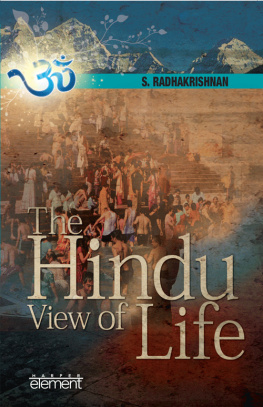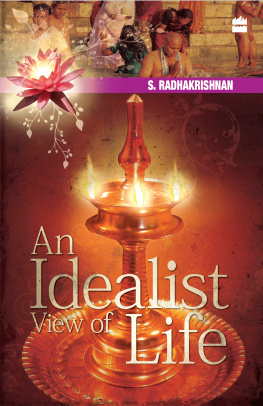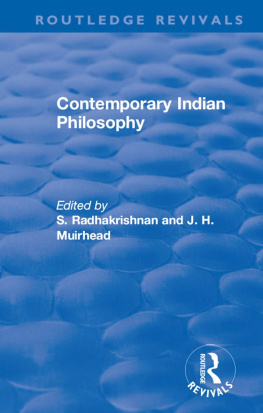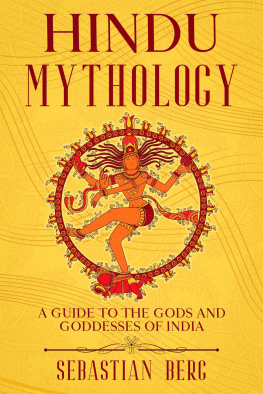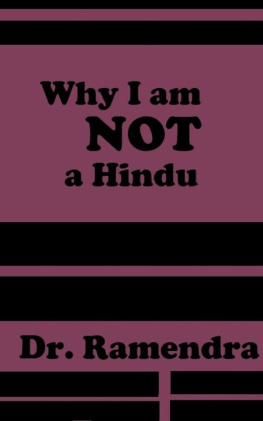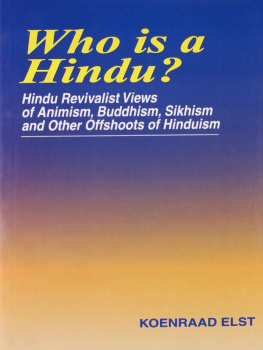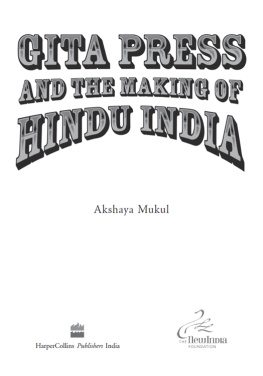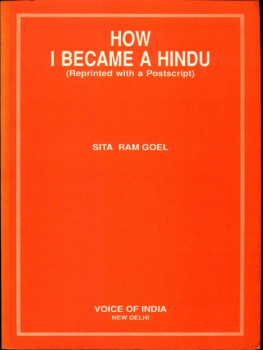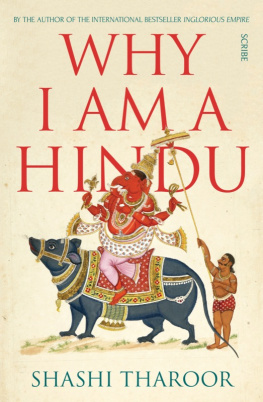S. Radhakrishnan - The Hindu View Of Life
Here you can read online S. Radhakrishnan - The Hindu View Of Life full text of the book (entire story) in english for free. Download pdf and epub, get meaning, cover and reviews about this ebook. year: 2015, publisher: Element, genre: Religion. Description of the work, (preface) as well as reviews are available. Best literature library LitArk.com created for fans of good reading and offers a wide selection of genres:
Romance novel
Science fiction
Adventure
Detective
Science
History
Home and family
Prose
Art
Politics
Computer
Non-fiction
Religion
Business
Children
Humor
Choose a favorite category and find really read worthwhile books. Enjoy immersion in the world of imagination, feel the emotions of the characters or learn something new for yourself, make an fascinating discovery.
- Book:The Hindu View Of Life
- Author:
- Publisher:Element
- Genre:
- Year:2015
- Rating:4 / 5
- Favourites:Add to favourites
- Your mark:
- 80
- 1
- 2
- 3
- 4
- 5
The Hindu View Of Life: summary, description and annotation
We offer to read an annotation, description, summary or preface (depends on what the author of the book "The Hindu View Of Life" wrote himself). If you haven't found the necessary information about the book — write in the comments, we will try to find it.
The Hindu View Of Life — read online for free the complete book (whole text) full work
Below is the text of the book, divided by pages. System saving the place of the last page read, allows you to conveniently read the book "The Hindu View Of Life" online for free, without having to search again every time where you left off. Put a bookmark, and you can go to the page where you finished reading at any time.
Font size:
Interval:
Bookmark:
Professor S. Radhakrishnan (18881975) was a prominent philosopher, author and educationalist. He was equally at home in the European and Asiatic traditions of thought, and devoted an immense amount of energy to interpreting Indian religion, culture and philosophy for the rest of the world. He was a visiting professor at many foreign universities, and served as Indias Ambassador Extraordinary to the USSR from 1949 to 1952. He was elected to the office of vice-president of India in 1957. He became the President of India in 1962 and held this rank until 1967, when he retired from public life.
He wrote a number of books for readers the world over. Some of his outstanding works are An Idealist View of Life, Indian Philosophy, Vols I and II, and a seminal translation of and commentary on the Bhagavadgita.
CHAPTER I
R ELIGIOUS E XPERIENCE: I TS N ATURE AND C ONTENT

At the outset, one is confronted by the difficulty of defining what Hinduism is. To many it seems to be a name without any content. Is it a museum of beliefs, a medley of rites, or a mere map, a geographical expression? Its content, if it has any, has altered from age to age, from community to community. The ease with which Hinduism has steadily absorbed the customs and ideas of peoples with whom it has come into contact is as great as the difficulty we feel in finding a common feature binding together its different forms. But, if there is not a unity of spirit binding its different expressions and linking up the different periods of its history into one organic whole, it will not be possible to account for the achievements of Hinduism. The dictum that, if we leave aside the blind forces of nature, nothing moves in this world which is not Greek in its origin, has become a commonplace with us. But it is not altogether true. Half the world moves on independent foundations which Hinduism supplied. China and Japan, Tibet and Siam, Burma and Ceylon look to India as their spiritual home. The civilization itself has not been a short-lived one. Its historic records date back for over four thousand years, and even then it had reached a stage of civilization which has continued its unbroken, though at times slow and almost static course, until the present day. It has stood the stress and strain of more than four or five millenniums of spiritual thought and experience. Though peoples of different races and cultures have been pouring into India from the dawn of history, Hinduism has been able to maintain its supremacy, and even the proselytizing creeds backed by political power have not been able to coerce the large majority of Indians to their views. The Hindu culture possesses some vitality which seems to be denied to some other more forceful currents. It is no more necessary to dissect Hinduism than to open a tree to see whether the sap still runs.
The Hindu civilization is so called, since its original founders or earliest followers occupied the territory drained by the Sindhu (the Indus) river system corresponding to the North-West Frontier province and the Punjab. This is recorded in the g Veda, the oldest of the Vedas, the Hindu scriptures which give their name to this period of Indian history. The people on the Indian side of the Sindhu were called Hindu by the Persian and the later western invaders. From the Punjab, the civilization flowed over into the valley of the Ganges where it met with numerous cults of primitive tribes. In its southward march the Aryan culture got into touch with the Dravidian and ultimately dominated it, though undergoing some modification from its influence. As the civilization extended over the whole of India, it suffered many changes, but it kept up its continuity with the old Vedic type developed on the banks of the Sindhu. The term Hindu had originally a territorial and not a credal significance. It implied residence in a well-defined geographical area. Aboriginal tribes, savage and half-civilized people, the cultured Dravidians and the Vedic Aryans were all Hindus as they were the sons of the same mother. The Hindu thinkers reckoned with the striking fact that the men and women dwelling in India belonged to different communities, worshipped different gods, and practised different rites.
As if this were not enough, outsiders have been pouring into the country from the beginning of its history, and some have made for themselves a home in India and thus increased the difficulty of the problem. How was Hindu society built up out of material so diverse, so little susceptible in many cases to assimilation, and scattered across a huge continent measuring nearly two thousand miles from north to south and eighteen hundred miles from west to east? It cannot be denied that in a few centuries the spirit of cultural unity spread through a large part of the land, and racial stocks of varying levels of culture became steeped in a common atmosphere. The differences among the sects of the Hindus are more or less on the surface, and the Hindus as such remain a distinct cultural unit, with a common history, a common literature and a common civilization. Mr Vincent Smith observes, India beyond all doubt possesses a deep underlying fundamental unity, far more profound than that produced either by geographical isolation or by political superiority. That unity transcends the innumerable diversities of blood, colour, language, dress, manners, and sect. In this task of welding together heterogeneous elements and enabling them to live in peace and order, Hinduism has had to adopt her own measures with little or no historic wisdom to guide and support her. The world is now full of racial, cultural and religious misunderstandings. We are groping in a timid and tentative way for some device which would save us from our suicidal conflicts. Perhaps the Hindu way of approach to the problem of religious conflicts may not be without its lessons for us.
The Hindu attitude to religion is interesting. While fixed intellectual beliefs mark off one religion from another, Hinduism sets itself no such limits. Intellect is subordinated to intuition, dogma to experience, outer expression to inward realization. Religion is not the acceptance of academic abstractions or the celebration of ceremonies, but a kind of life or experience. It is insight into the nature of reality (darana), or experience of reality (anubhava). This experience is not an emotional thrill, or a subjective fancy, but is the response of the whole personality, the integrated self to the central reality. Religion is a specific attitude of the self, itself and no other, though it is mixed up generally with intellectual views, aesthetic forms, and moral valuations.
Religious experience is of a self-certifying character. It is svatassiddha. It carries its own credentials. But the religious seer is compelled to justify his inmost convictions in a way that satisfies the thought of the age. If there is not this intellectual confirmation, the seers attitude is one of trust. Religion rests on faith in this sense of the term. The mechanical faith which depends on authority and wishes to enjoy the consolations of religion without the labour of being religious is quite different from the religious faith which has its roots in experience. Wesley asks, What is faith? and answers, Not an opinion nor any number of opinions put together, be they ever so true. It is the vision of the soul, that power by which spiritual things are apprehended, just as material things are apprehended by the physical senses. Blind belief in dogma is not the faith which saves. It is an unfortunate legacy of the course which Christian theology has followed in Europe that faith has come to connote a mechanical adherence to authority. If we take faith in the proper sense of trust or spiritual conviction, religion is faith or intuition. We call it faith simply because spiritual perception, like other kinds of perception, is liable to error and requires the testing processes of logical thought. But, like all perception, religious intuition is that which thought has to start from and to which it has to return. In order to be able to say that religious experience reveals reality, in order to be able to transform religious certitude into logical certainty, we are obliged to give an intellectual account of the experience. Hindu thought has no mistrust of reason. There can be no final breach between the two powers of the human mind, reason and intuition. Beliefs that foster and promote the spiritual life of the soul must be in accordance with the nature and the laws of the world of reality with which it is their aim to bring us into harmony. The chief sacred scriptures of the Hindus, the Vedas, register the intuitions of the perfected souls. They are not so much dogmatic dicta as transcripts from life. They record the spiritual experiences of souls strongly endowed with the sense for reality. They are held to be authoritative on the ground that they express the experiences of the experts in the field of religion. If the utterances of the Vedas were uninformed by spiritual insight, they would have no claim to our belief. The truths revealed in the Vedas are capable of being re-experienced on compliance with ascertained conditions. We can discriminate between the genuine and the spurious in religious experience, not only by means of logic but also through life. By experimenting with different religious conceptions and relating them with the rest of our life, we can know the sound from the unsound.
Next pageFont size:
Interval:
Bookmark:
Similar books «The Hindu View Of Life»
Look at similar books to The Hindu View Of Life. We have selected literature similar in name and meaning in the hope of providing readers with more options to find new, interesting, not yet read works.
Discussion, reviews of the book The Hindu View Of Life and just readers' own opinions. Leave your comments, write what you think about the work, its meaning or the main characters. Specify what exactly you liked and what you didn't like, and why you think so.

